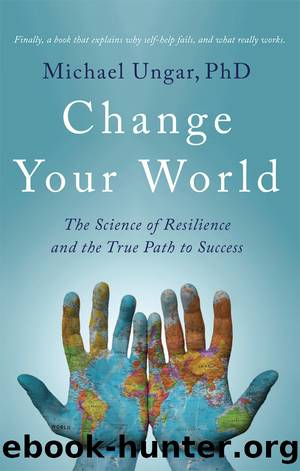Change Your World by Michael Ungar

Author:Michael Ungar
Language: eng
Format: epub
Publisher: Sutherland House Books
Chapter 7
The Institutions We
Need (But Seldom Get)
FIFTEEN YEARS AGO, when I began researching resilience, I was invited to MedellÃn, Colombia, to see how the most violent city on Earth was transforming itself. Home to the infamous drug lord Pablo Escobar (before he was killed), MedellÃn was riddled with violence as gangs fought for control of the lucrative drug trade. Paramilitaries were at war with the military, and somewhere in the background was a terrorist organization known as FARC. It was a tremendous shame. MedellÃn is a stunningly beautiful city, set amid the rolling Andes Mountains on the equator. Its climate is constant, with warm days and pleasantly cool evenings all year round. The hills are dotted with greenhouses growing flowers exported to the world. A lucrative lingerie industry adds to the mystique and eroticism of the Antioquian people.
During my first trip to Colombia, the streets were so violent that I remained hidden in the offices of the University of Antioquia, with armed guards at the gate. I could not venture into the favelas that ring the city, climbing up the mountainsides in progressive waves. But I did meet many courageous educators and youth workers who had devoted their lives to break the cycle of violence and to help children find futures that did not include drugs, guns, or gangs. Among the most inspiring was the principal at one of the Pâ12 schools near to where Escobar used to live. She stood less than five feet tall but commanded everyoneâs respect. She kept her school open, even after stray bullets from street fights had killed four students on her playground. âWhere else would the children go?â she asked me, not expecting an answer, but also not expecting my admiration. âIn my community, when children hear gunfire in the streets, their parents tell them to hide behind cement walls, then carry on to school when the gunfire stops.â She must have seen the shock on my face. âThey have adjusted,â she explained. âThey had to.â
Fortunately, the violence in MedellÃn has subsided. Better policing helped, but so too did changes to the infrastructure of the city. People were given hope through substantial public investment in their futures. Mass transit and access to jobs, libraries, and improved public education signaled to people that there were opportunities for them and their children beyond the drug trade. Programs for children, parents, and educators challenged everyone to break the cycle of violence. Teachers were taught to discipline children without resorting to corporeal punishment, and parents were given the support of in-home counselors to help them do the same. Children that had simply accepted violence as a normal part of their culture were learning to expect fair treatment from caregivers.
Resilience can be mere theory until you witness an entire population becoming more successful. I made many visits to MedellÃn and each time noticed that my movements were becoming freer. I could walk to a mall or spend time in the downtown square during daylight hours. Eventually, I visited the school where that principal worked and saw her walk among her students.
Download
This site does not store any files on its server. We only index and link to content provided by other sites. Please contact the content providers to delete copyright contents if any and email us, we'll remove relevant links or contents immediately.
Rewire Your Anxious Brain by Catherine M. Pittman(18654)
Talking to Strangers by Malcolm Gladwell(13370)
The Art of Thinking Clearly by Rolf Dobelli(10489)
Mindhunter: Inside the FBI's Elite Serial Crime Unit by John E. Douglas & Mark Olshaker(9343)
Becoming Supernatural by Dr. Joe Dispenza(8217)
Change Your Questions, Change Your Life by Marilee Adams(7781)
Nudge - Improving Decisions about Health, Wealth, and Happiness by Thaler Sunstein(7706)
The Road Less Traveled by M. Scott Peck(7603)
The Lost Art of Listening by Michael P. Nichols(7506)
Mastermind: How to Think Like Sherlock Holmes by Maria Konnikova(7347)
Enlightenment Now: The Case for Reason, Science, Humanism, and Progress by Steven Pinker(7313)
Win Bigly by Scott Adams(7198)
The Way of Zen by Alan W. Watts(6614)
Daring Greatly by Brene Brown(6513)
Big Magic: Creative Living Beyond Fear by Elizabeth Gilbert(5771)
Grit by Angela Duckworth(5614)
Ego Is the Enemy by Ryan Holiday(5448)
Men In Love by Nancy Friday(5240)
The Laws of Human Nature by Robert Greene(5208)
